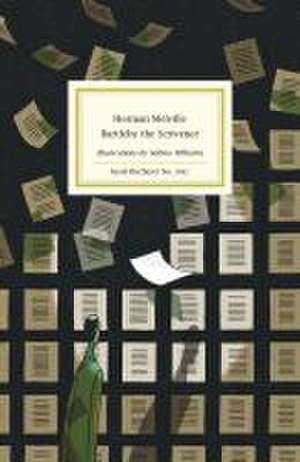Bartleby, the Scrivener: Insel-Bücherei, cartea 1482
Autor Herman Melville Ilustrat de Sabine Wilharmen Limba Engleză Hardback – 8 mar 2020
| Toate formatele și edițiile | Preț | Express |
|---|---|---|
| Paperback (26) | 26.22 lei 3-5 săpt. | +2.92 lei 7-13 zile |
| Mint Editions – 2021 | 26.22 lei 3-5 săpt. | +2.92 lei 7-13 zile |
| CreateSpace Independent Publishing Platform – | 36.47 lei 3-5 săpt. | |
| CreateSpace Independent Publishing Platform – | 37.59 lei 3-5 săpt. | |
| CreateSpace Independent Publishing Platform – | 37.98 lei 3-5 săpt. | |
| – | 39.84 lei 3-5 săpt. | |
| – | 44.13 lei 3-5 săpt. | |
| CreateSpace Independent Publishing Platform – | 45.12 lei 3-5 săpt. | |
| CreateSpace Independent Publishing Platform – | 45.18 lei 3-5 săpt. | |
| – | 45.41 lei 3-5 săpt. | |
| CreateSpace Independent Publishing Platform – | 45.41 lei 3-5 săpt. | |
| CreateSpace Independent Publishing Platform – | 46.00 lei 3-5 săpt. | |
| – | 48.60 lei 3-5 săpt. | |
| CreateSpace Independent Publishing Platform – | 50.46 lei 3-5 săpt. | |
| CreateSpace Independent Publishing Platform – | 50.70 lei 3-5 săpt. | |
| CREATESPACE – | 51.05 lei 3-5 săpt. | |
| CreateSpace Independent Publishing Platform – | 51.28 lei 3-5 săpt. | |
| CreateSpace Independent Publishing Platform – | 51.69 lei 3-5 săpt. | |
| – | 55.20 lei 3-5 săpt. | |
| – | 66.17 lei 3-5 săpt. | |
| CreateSpace Independent Publishing Platform – 16 dec 2015 | 47.71 lei 6-8 săpt. | |
| – | 49.04 lei 6-8 săpt. | |
| Lulu.Com – 26 aug 2018 | 49.98 lei 6-8 săpt. | |
| – | 52.65 lei 6-8 săpt. | |
| – | 58.04 lei 6-8 săpt. | |
| Binker North – 31 oct 1853 | 62.46 lei 6-8 săpt. | |
| – | 91.73 lei 6-8 săpt. | |
| Hardback (3) | 91.06 lei 18-23 zile | +7.89 lei 7-13 zile |
| Insel Verlag GmbH – 8 mar 2020 | 91.06 lei 18-23 zile | +7.89 lei 7-13 zile |
| Binker North – noi 1853 | 122.28 lei 6-8 săpt. | |
| Lulu.Com – 26 aug 2018 | 150.95 lei 6-8 săpt. | +16.45 lei 7-13 zile |
Din seria Insel-Bücherei
-
 Preț: 67.32 lei
Preț: 67.32 lei -
 Preț: 58.47 lei
Preț: 58.47 lei -
 Preț: 61.13 lei
Preț: 61.13 lei -
 Preț: 64.75 lei
Preț: 64.75 lei -
 Preț: 64.40 lei
Preț: 64.40 lei -
 Preț: 63.32 lei
Preț: 63.32 lei -
 Preț: 64.50 lei
Preț: 64.50 lei -
 Preț: 60.60 lei
Preț: 60.60 lei -
 Preț: 61.87 lei
Preț: 61.87 lei -
 Preț: 61.65 lei
Preț: 61.65 lei -
 Preț: 79.73 lei
Preț: 79.73 lei -
 Preț: 59.31 lei
Preț: 59.31 lei -
 Preț: 60.26 lei
Preț: 60.26 lei -
 Preț: 68.75 lei
Preț: 68.75 lei -
 Preț: 56.57 lei
Preț: 56.57 lei -
 Preț: 56.60 lei
Preț: 56.60 lei -
 Preț: 68.25 lei
Preț: 68.25 lei -
 Preț: 49.90 lei
Preț: 49.90 lei -
 Preț: 59.61 lei
Preț: 59.61 lei -
 Preț: 62.56 lei
Preț: 62.56 lei -
 Preț: 62.48 lei
Preț: 62.48 lei -
 Preț: 60.80 lei
Preț: 60.80 lei -
 Preț: 61.83 lei
Preț: 61.83 lei -
 Preț: 61.29 lei
Preț: 61.29 lei -
 Preț: 62.42 lei
Preț: 62.42 lei -
 Preț: 60.67 lei
Preț: 60.67 lei -
 Preț: 85.97 lei
Preț: 85.97 lei -
 Preț: 66.15 lei
Preț: 66.15 lei -
 Preț: 60.46 lei
Preț: 60.46 lei -
 Preț: 59.39 lei
Preț: 59.39 lei -
 Preț: 76.10 lei
Preț: 76.10 lei -
 Preț: 55.39 lei
Preț: 55.39 lei -
 Preț: 82.87 lei
Preț: 82.87 lei -
 Preț: 81.72 lei
Preț: 81.72 lei -
 Preț: 82.08 lei
Preț: 82.08 lei -
 Preț: 91.97 lei
Preț: 91.97 lei -
 Preț: 75.22 lei
Preț: 75.22 lei -
 Preț: 76.89 lei
Preț: 76.89 lei -
 Preț: 91.36 lei
Preț: 91.36 lei -
 Preț: 81.90 lei
Preț: 81.90 lei -
 Preț: 84.54 lei
Preț: 84.54 lei -
 Preț: 77.81 lei
Preț: 77.81 lei -
 Preț: 82.71 lei
Preț: 82.71 lei -
 Preț: 89.42 lei
Preț: 89.42 lei -
 Preț: 77.10 lei
Preț: 77.10 lei -
 Preț: 68.23 lei
Preț: 68.23 lei -
 Preț: 81.41 lei
Preț: 81.41 lei
Preț: 91.06 lei
Nou
Puncte Express: 137
Preț estimativ în valută:
17.42€ • 18.63$ • 14.53£
17.42€ • 18.63$ • 14.53£
Carte disponibilă
Livrare economică 24-29 martie
Livrare express 13-19 martie pentru 17.88 lei
Preluare comenzi: 021 569.72.76
Specificații
ISBN-13: 9783458194828
ISBN-10: 3458194827
Pagini: 75
Dimensiuni: 116 x 183 x 12 mm
Greutate: 0.16 kg
Editura: Insel Verlag GmbH
Seria Insel-Bücherei
ISBN-10: 3458194827
Pagini: 75
Dimensiuni: 116 x 183 x 12 mm
Greutate: 0.16 kg
Editura: Insel Verlag GmbH
Seria Insel-Bücherei
Notă biografică
Herman Melville, geboren am 1. August 1819 in New York, stammte aus einer verarmten Kaufmannsfamilie. Ab 1839 war er Matrose, unter anderem auf Walfangschiffen. 1844 kehrte er in die USA zurück und arbeitete als freier Schriftsteller. 1851 schrieb er Moby Dick, der Roman verkaufte sich zu seinen Lebezeiten nur 3000-mal und ist heute einer der wichtigsten Romane der Weltliteratur. Melville starb am 28. September 1891 in New York.
